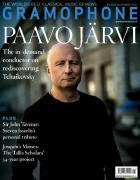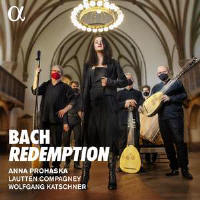Texte paru dans: / Appeared in: |
|
|
Outil de traduction (Très approximatif) |
|
|
Reviewer: Tim Ashley This is an album about music and coronavirus. Anna Prohaska, it would seem, had been contemplating a disc of extracts from Bach’s cantatas with Lautten Compagney and Wolfgang Katschner for a while, ideas to which the outbreak of the pandemic gave added urgency. The recording was made under Covid restrictions in June in a Berlin church, the sessions illustrated in the accompanying booklet with shots of distanced performers, sometimes masked, and described, in some of the publicity material, almost as a series of impromptu get-togethers. Using a choir was an impossibility, so choruses are sung by four solo singers, Prohaska taking the soprano line. Chorales are given in instrumental arrangements, we are not told by whom. We’re also not told whether the impact of Covid-19 affected Prohaska’s original intentions with regard to the programme, though what she gives us is very much an album about grief, acceptance and consolation. As with her ‘Paradise Lost’ recital (7/20), we’re very much aware of great intelligence and intellect at work, and the disc’s emotional trajectory relates to the stages of grief, ‘a blend of denial and anger as well as depression and acceptance’, controversially outlined in the work of the Swiss-American psychiatrist Elisabeth Kübler-Ross. The opening is stark and notably austere, with ‘Bete aber auch dabei’ from Cantata No 115, followed by the chorus ‘Es ist nichts Gesundes an meinem Leibe’, and the chorale ‘Ehr sei ins Himmels Throne’, sombrely played by Lautten Compagney’s brass. Thereafter certainty and doubt alternate in arias suggestive of assertion and reflection. The chromatic unease of ‘Wie zittern und wanken’ comes as a jolt after the florid, almost breezy coloratura of ‘Ich ende behende mein irdisches Leben’. ‘Liebster Gott, erbarme dich’, near the disc’s mid-point, forms the anguished climax, after which the mood becomes increasingly serene, eventually reaching the quiet acceptance of death of ‘Die Seele ruht in Jesu Händen’. A closing ‘bonus track’ returns to ‘Bete aber auch dabei’, now turned into an up-tempo jazz riff, very Jacques Loussier: you might think it belongs on a different album. Purists may also not care for the way arias and choruses are taken out of context and refashioned into a new emotional narrative, and faced with Prohaska’s juxtaposition of the opening and closing arias of Ich habe genug, I admit to wanting the cantata in its entirety. But the whole disc is done with such affecting sincerity that any qualms are simply swept away. Apart from a couple of phrases taken from below, Prohaska is in beautiful voice, her tone even and silvery, her coloratura accurate and expressive. ‘Ich habe genug’ dances almost joyously, and ‘Weichet nur, betrübte Schatten’ sounds exquisite. That the high tesstitura of ‘Liebster Gott, erbarme dich’ results in the occasional occluded vowel adds to rather than detracts from its intensity. The jazz ‘Bete aber’ is terrific. In the choruses she’s very much a member of an ensemble of equals, and as so often when Bach is done with a single voice to a line, the counterpoint is blindingly clear. Lautten Compagney’s playing has an uncompromising, austere beauty and the string and woodwind obbligatos are simply ravishing. Extraordinarily moving, it really does offer consolation in dark times. Do listen to it.
INTERVIEW / ENTREVUE
Anna Prohaska The Austrian soprano discusses the circumstances and programming behind her latest album, ‘Redemption’
The album has a sense of consolation that feels appropriate and very moving. Did you choose Bach for this reason?
Aside from the recording signifying a kind of salvation for us musicians – being able to make music in the same space, rather than at home either alone or online – we wanted to send out a signal of hope: that even during a pandemic and when cultural politics seems to abandon us, music cannot be killed off. We were in the middle of lockdown – in fact legally it was a grey area – and in these desperate times (not just regarding Covid but also world politics and climate change), Bach’s music is like a consoling hand. For agnostics it can be a quasi-divine guidance, prompting us to think about our place in the world. Bach never abandons us!
The booklet note describes the programme as relating to the four stages of grief, from denial and anger to depression and acceptance. How did you put these elements together?
The question that particularly interested me was whether a Protestant in the Baroque era viewed sin as a festering sickness that manifested itself physically, or as something imposed on him from outside, by God. In our programme it is as if the suffering sinner takes us by the hand and leads us through all the psychological highs and lows he encounters while preparing for death. One might think this is not a very consoling prospect in the face of the world’s current challenges – but that is reckoning without Bach, who invariably manages to set the most depressing pietist texts with a glimmer of hope shining through. Think of the angelically soaring obbligato oboe solo in the aria ‘Letzte Stunde, brich herein’, or the solo lute in ‘Ich habe genug’ complementing the voice like a shadow, as if the soul were evaporating into the heavens while the body, the human voice, is clinging to life.
Did you intend that the album should be heard as a single entity?
One probably does benefit from listening to it as a whole programme. Rock bottom is reached in the final third of the album with the raw desperation of ‘Liebster Gott, erbarme dich’ and passive acceptance in ‘Ich habe genug’. By the time we reach ‘Die Seele ruht’ it’s almost an out-of-body experience as the narrator describes what is happening to his own soul. The clouds shift, and the ray of light of the solo oboe and the imitating soprano voice burst through in ‘Weichet nur, betrübte Schatten’. Ironically, this is the only secular aria on the album – perhaps an enlightenment in more than one sense … |
|




